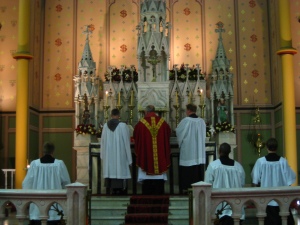
Bishop Robert C. Morlino recites the prayers of the Extraordinary Form of the Mass, commonly known as the Tridentine Mass, at St. Augustine Parish in Sydney (Catholic Herald photo by Ben Emmel)
SYDNEY — Bishop Robert Morlino capped off the diocesan pilgrimage to Australia for World Youth Day by celebrating an Extraordinary Form of the Mass Wednesday.
In comments before the Mass, Bishop Morlino said that the celebration of this older form of the Mass was a moment to understand the power of the Holy Spirit, present in both the older Mass and the new.
“We’re doing this today because we’re trying to experience the Holy Spirit in our time,” remarked Bishop Morlino. “He’s not present in one generation more than another. The Holy Spirit is the soul of the Church every moment throughout history.”
This Mass is not deficient, nor is the current Novus Ordo Mass. “The Holy Spirit rules over the liturgy, and calls young women and men though it. But my intention is that you realize that this liturgy is what the (Vatican II) council fathers celebrated. It’s not pre-Vatican II: it is Vatican II.”
The celebration of the Tridentine Mass also ties into the theme of World Youth Day, Bishop Morlino said. “We’re trying to understand the Holy Spirit. This is about how the Holy Spirit works through every generation.”
Bishop Morlino also provided a short catechesis on the meaning of the phrase “active participation” that arose out of the discussions and documents of the Second Vatican Council. “The council fathers deliberately chose to use the word ‘actuosa’ for the word ‘act’ and not use the word ‘activa.'”
“Activa means get as many people in the sanctuary as possible, for example,” Bishop Morlino said. “The council fathers deliberately rejected this.”
The bishop remarked how “actuosa” is the correct teaching of the Church, with moments of contemplation within the Mass. “This is the teaching of the Church, this is actuosa: when the silent moments of the Mass are important.” The importance of silence is especially crucial in the understanding of the Extraordinary Form, as much of the Mass is spent by the lay faithful in silent and private prayer.
The different forms of response in the Mass do not reflect a rip or break in the teachings of the Church, however. “There is a continuity in the liturgy,” Bishop Morlino remarked. “Pope Benedict is very much concerned with this. If there is no continuity, then there is no Holy Spirit.”
The bishop ended by exhorting the young people to participate fully in the Mass. “The participation that counts is the actuosa, the spiritual faith life,” he said.

